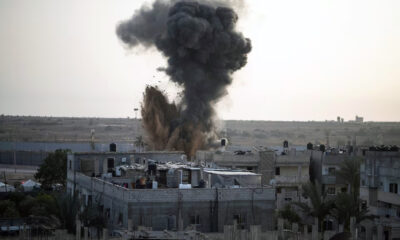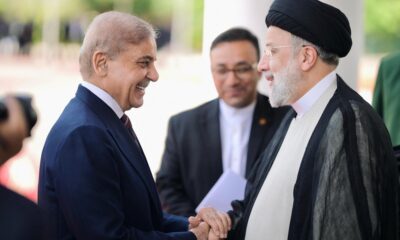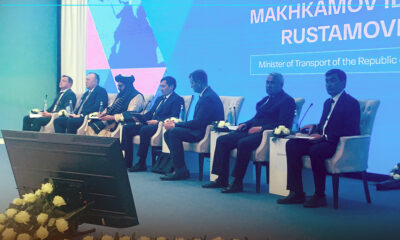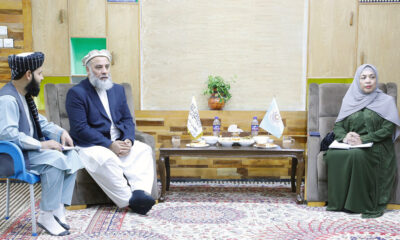Latest News
IEA reject claims by UNSC that foreign groups are active in Afghanistan
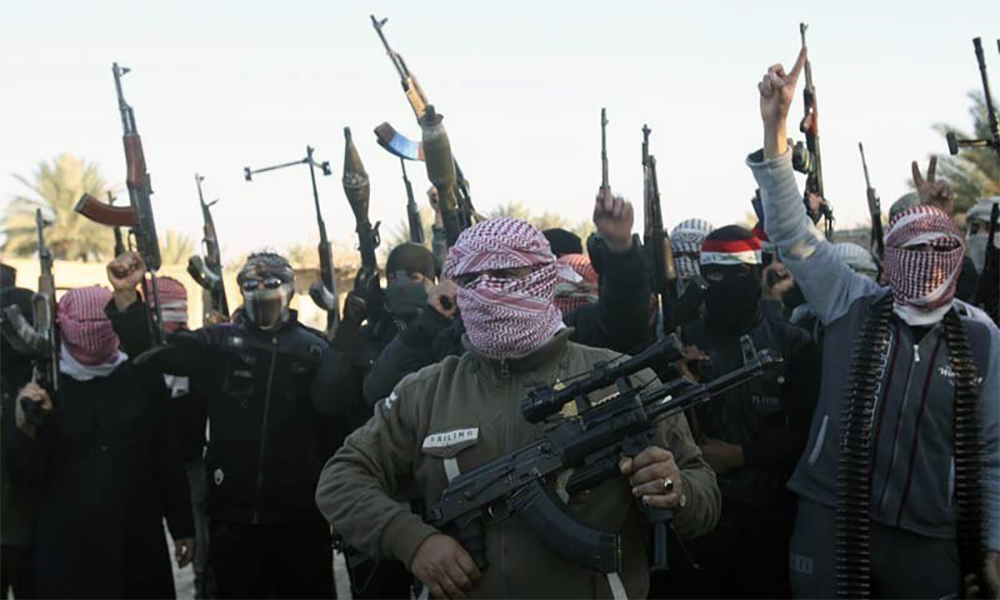
The Islamic Emirate of Afghanistan (IEA) on Monday rejected claims by the United Nations Security Council (UNSC) that there are foreign terrorist groups sheltering in Afghanistan.
In a statement issued by the foreign ministry, the IEA said there were no foreign groups in the country and that for the past nine months, the new government has worked to build an environment of trust between Afghanistan and the international community.
The ministry said it “views UNSC Monitoring Team Report (13) asserting the existence and operation of foreign groups in Afghanistan as unfounded and rejects it in the strongest terms.”
“The fact remains that since the return to power of the Islamic Emirate, the world and the region have been prevented from facing any harm from Afghanistan,” the foreign ministry statement said.
The IEA said it will live up to its commitments and ensure that no country is threatened by Afghanistan.
The foreign ministry also called on the UNSC to obtain facts and to allow the IEA’s representatives to take up their rightful posts at the United Nations.
“We also urge abstinence from seeking unsubstantiated information from anonymous sources, and to grant the current Afghan government its legitimate right to directly present factual information to the UNSC and other countries through its permanent representatives at the UN,” read the statement.
The United Nations Security Council report, released on Friday, stated there is a persistent threat to Pakistan’s security from the Afghanistan-based Tehreek-e-Taliban Pakistan (TTP) and warned that prospects of success of the ongoing peace process with the terror group were bleak,
The annual report of the 1988 IEA sanctions committee monitoring team noted TTP’s linkages with the IEA and explained how they benefitted from the fall of the Ashraf Ghani regime last year and touched upon the IEA’s relations with other terrorist groups operating from Afghanistan.
The TTP, the report noted, had up to 4,000 fighters based in east and south-east areas along the Afghanistan-Pakistan border and made up the largest group of foreign fighters based there.
This was the team’s first report for the committee since the IEA takeover of Kabul in August last year.
The UNSC stated in its report: “The Taliban (IEA) victory in Afghanistan has inspired terrorists around the world, although the relocation of foreign terrorist fighters to Afghanistan has not materialized in significant numbers.
“The Taliban have continued to insist publicly that there are no foreign terrorist fighters in Afghanistan, even though Member States are clear that many fought alongside the Taliban in 2021.
“Central Asian embassies based in Afghanistan reported with concern the appearance of several leaders of foreign terrorist groups apparently moving freely around Kabul from August onwards,” the report stated.
However, the UNSC stated that “there are reports that the Taliban (IEA) have forced some foreign terrorist fighters to disarm or have relocated others away from the capital so that they remain inconspicuous.”
“TTP constitutes the largest component of foreign terrorist fighters in Afghanistan, with their number estimated to be several thousand. Other groups include the Eastern Turkistan Islamic Movement (ETIM), Islamic Movement of Uzbekistan, Jaish-i-Mohammed (JiM), Jamaat Ansarullah and Lashkar-e-Tayyiba (LeT), with each numbering in the few hundreds,” read the report.
“TTP has arguably benefitted the most of all the foreign extremist groups in Afghanistan from the Taliban (IEA) takeover.
“It has conducted numerous attacks and operations in Pakistan. TTP also continues to exist as a stand-alone force, rather than feeling pressure to merge its fighters into Afghan Taliban units, as is the prospect for most foreign terrorist fighters,” read the report.
The UNSC meanwhile said in its report that following the IEA takeover, some members of ETIM were relocated IEA from Badakhshan to provinces further from the Chinese border as part of the Taliban’s efforts both to protect and restrain the group.
“Assessments of the group’s size range from a low of several dozen fighters, according to one Member State, to as many as 1,000 members, according to other Member States,” UNSC reported.
The report noted that several Member States reported some ETIM members have fraudulently obtained local identity documents by fabricating Afghan identities. “The group is seeking to further entrench its presence in the country by both organizing marriages to local women and facilitating the relocation of Uighur women to Afghanistan.”
Latest News
Mullah Baradar discusses creation of railway with Kazakh deputy PM

Mullah Abdul Ghani Baradar, deputy prime minister for economic affairs has met with Erik Zhumangarin, the Deputy Prime Minister of Kazakhstan, and discussed the establishment of a railway network from Kazakhstan to Pakistan through Turkmenistan and Afghanistan, the deputy PM’s office said in a statement.
During the meeting, Baradar emphasized the need to sign agreements to solve the banking problems of traders from both countries, the creation of Afghan-Kazakh joint companies, and the facilitation of visas for Afghan traders.
According to the statement, the Deputy Prime Minister of Kazakhstan said that the Kazakh government intends to establish a joint chamber of industry and commerce and a joint trade and labor group between the two countries, and is ready to cooperate with Afghanistan in the sectors of e-governance, industry, higher education, education, health, and banking.
Latest News
Iran, Pakistan leaders raise concerns over ‘terrorist groups’ in Afghanistan

Following a two-day official visit to Pakistan, Iranian President Ebrahim Raisi and Pakistan’s Prime Minister Shehbaz Sharif issued a joint statement emphasizing the need to further expand commercial and economic cooperation and transform the common border of the two countries from a “border of peace” to “border of prosperity”.
The two leaders also strongly condemned aggressions and crimes of Israel in Gaza, and demanded an immediate and unconditional ceasefire, as well as unimpeded humanitarian access to the besieged people of Gaza.
Numerous other issues were also discussed but on the topic of Afghanistan, they jointly declared their commitment to the development of Afghanistan as a peaceful, united, independent country free from the threats of terrorism and drug trafficking.
According to the statement the two countries pointed out that the existence of terrorist organizations in Afghanistan is a serious threat to the security of the region and the world.
The two sides stressed their desire to strengthen cooperation in the field of fighting terrorism and ensuring security and creating a united front against terrorism.
They also discussed the importance of coordinating regional and international efforts to ensure security and stability in the region.
“While respecting the sovereignty and territorial integrity of Afghanistan, the two sides recognized that increasing participation of all strata of Afghans in basic decision-making will lead to the strengthening of peace and stability in this country,” the statement read.
Latest News
Over 1,000 Afghan refugees forced out of Pakistan in one day

The Ministry of Refugees and Repatriations (MoRR) says over 1,000 Afghan migrants were forcibly returned from Pakistan on Tuesday through Spin Boldak border crossing in Kandahar province, the ministry said in a statement.
The ministry stated that based on information provided by the Spin Boldak Kandahar border command, these returnees comprised 191 families, totalling 998 people.
In addition, three migrants released from Pakistani prisons were also returned, according to the statement.
The statement added that after registering the returnees, the refugees were referred to the offices of the International Organization for Migration (IOM), the World Food Program (WFP) and the United Nations High Commissioner for Refugees (UNHCR).
Each family received 10,000 afghanis – paid to them by the Islamic Emirate.
In another statement, the ministry said that 2,783 migrants living in Iran voluntarily and forcibly returned to the country during this week.
-

 Sport5 days ago
Sport5 days agoAfghanistan Champions League kicks off with grand opening ceremony
-

 Latest News4 days ago
Latest News4 days agoPakistan’s frontiers minister stresses ‘dignified’ return of Afghan refugees
-

 Business5 days ago
Business5 days agoAfghanistan’s economic prospects are bleak: World Bank
-

 Latest News5 days ago
Latest News5 days agoMore than 800 Afghan refugees deported from Pakistan in two days
-

 Regional3 days ago
Regional3 days agoIranian president lands in Pakistan for three-day visit to mend ties
-

 Climate Change4 days ago
Climate Change4 days agoMassive river flooding expected in China, threatening millions
-

 Latest News4 days ago
Latest News4 days agoChinese keen to invest in Panjshir-Kabul water conduit project
-
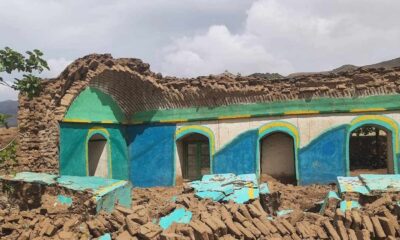
 Latest News5 days ago
Latest News5 days agoRoof collapse kills two in Helmand


